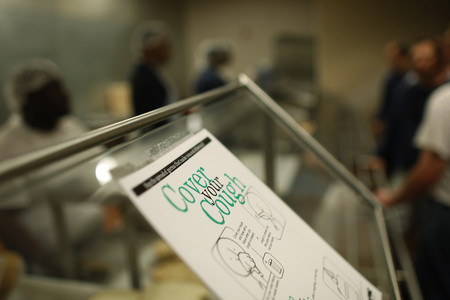Prisons keep flu down
Inmates who shuffled through the evening chow line Wednesday passed a sign that warned them to cover their mouths if they coughed.
Other messages stressing good hygiene also dotted the Casa Grande Transitional Center correctional institution on Russell Road near Valley View Boulevard.
This has largely been the strategy for keeping the H1N1 virus from infecting the more than 15,000 men and women who live or work in correctional facilities in Nevada, places that, according to the federal Centers for Disease Control and Prevention, pose special risks for spreading disease.
The Southern Nevada Health District alone has had thousands of doses of H1N1 vaccine on hand for weeks, but as of Thursday, only 300 doses had been distributed by public health officials to the Nevada Department of Corrections.
Just 10 doses went to prison inmates, pregnant women.
Unlike Nevadans in high-risk priority groups who have been offered vaccinations at numerous clinics or through private physicians, the more than 4,000 inmates determined by state corrections health officials to fall in high-risk priority groups haven't gotten that chance, other than the pregnant inmates.
The state's approach to dealing with the H1N1 virus in correctional facilities could backfire, warned Allen Lichtenstein, general counsel of the American Civil Liberties Union in Nevada.
"There are people who will say, 'They're just prisoners. Who cares?'" Lichtenstein said. "But this isn't just a problem for inmates. If this epidemic spreads among thousands in there -- and it easily could in the overcrowded conditions that are present -- the state is going to be faced with how to deal with this.
"It's not just going to stay there. People work and visit there. It's a potential disaster. Just from a financial standpoint, it's quite a gamble."
Ed Harrison, president of the Chicago-based National Commission on Correctional Health Care, said if the flu spreads in prisons, it's possible that area hospitals would have to take care of prisoners.
"Then you've got transportation and security issues to take care of," he said.
But so far, the "gamble" in not vaccinating prisoners has produced no real losers.
Suzanne Pardee, a correctional system spokeswoman who stood in the Casa Grande cafeteria as prisoners ate nearby, noted that only eight prisoners statewide have had confirmed cases of the swine flu. She acknowledged that other cases might have been so mild that they went unreported.
She said the system asked the health division for more than 15,000 doses to cover both employees and prisoners.
"We obviously know there has been a shortage of vaccine," she said, adding that inmates in high-risk priority groups have asked to receive the vaccine.
Tom Skinner, a spokesman for the Centers for Disease Control and Prevention, said the federal agency's recommendations regarding vaccinations for people in high-risk groups -- including men and women ages 25 to 64 with certain chronic health conditions -- extend to those in prison.
"Whether to offer it (the vaccine) to prisoners is up to state public health officials," he said.
Martha Framsted, a spokeswoman for the Nevada State Health Division, said all people who fall into the priority groups "should have the opportunity to receive the vaccine."
But she said a lack of vaccine has tied the health division's hands in offering more to the prison population.
Framsted said the Southern Nevada Health District has stockpiled vaccine, prompting the state health division to reallocate the district's supply.
At least 25,000 doses of the nearly 60,000 doses held by the Southern Nevada Health District were being redirected last week to area hospitals, she said. Also, 14,000 doses will soon be in area pharmacies.
Framsted said 1,000 doses of vaccine are being sent to prisons. She said the prison system has been treated as a single private physician who asks for vaccine.
"It is a policy decision, not a political decision," she said, rejecting the notion that the prison system has received little vaccine because vaccinating convicted criminals might be unpopular with the public.
In several states, politicians responding to public uproar over the possibility of vaccinating convicts have been quick to say that prisoners -- whether they're in priority groups or not -- won't get vaccinated before the general public does, unless they're pregnant.
The public health strategy that has been used regarding state correctional facilities also has played out at county lockups. No inmates at the Clark County Detention Center have been vaccinated against the H1N1 virus, regardless of whether they are in a high-risk group, according to officer Jacinto Rivera, a Las Vegas police spokesman.
Rivera said some staffers at the jail, which holds 3,000 inmates, did get the vaccine.
The prison system's Pardee credits "good hygiene," "good quarantines" and "good luck" for keeping the H1N1 virus from spreading through the state's prison system.
She said Nevada prison officials ensure that common areas in facilities are routinely cleaned to stop the spread of the disease. Tamiflu antiviral medication has been given to prisoners with the flu, she said.
The means for appropriate hand cleansing at institutions have been made readily available, she said, including at visitation and staff restricted areas and at intake operations where inmates are processed.
Pardee said the men and women kept at Case Grande work at jobs within the Las Vegas Valley. It is often the last step before parole for those convicted of felonies that include robbery, burglary and fraud.
"They're out in the community every day," she said.
When convicts get the flu, Pardee said, they are immediately isolated "as much as possible." Individual cells or portions of facilities have been cordoned off.
She is particularly happy that no visitation has had to be cut off at any Nevada correctional facility.
"It becomes very hard to control a prison when visitation is cut off," she said.
The Nevada state correctional system includes prisons, inmate camps, and restitution and transitional centers among its 20 facilities.
Pardee said the few hundred doses of vaccine received by the prison system went basically to front-line correction health care workers and the few pregnant women.
Some of the system's 2,500 employees could have received H1N1 vaccinations at public health clinics across the state, she said.
Harrison said the national commission on correctional health care that he represents has been closely following the H1N1 outbreak.
So far, he said, prisons have been able to handle outbreaks.
"Luckily, this virus hasn't been as devastating as many people feared just a few months ago," he said.
Harrison said he understands the public emotion that accompanies an infectious disease outbreak when medical supplies are limited and decisions have to be made on who receives them.
"Jails and prisons are part of communities," he said. "If they think that disease won't spread from there -- when you have visitors, workers and delivery people there every day -- they're mistaken."
Contact reporter Paul Harasim at pharasim@reviewjournal.com or 702-387-2908.
























